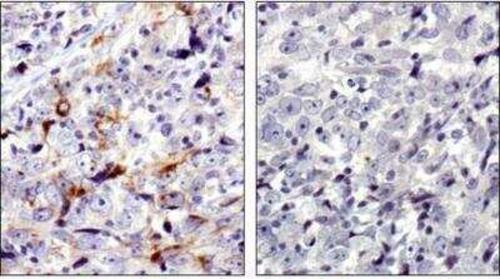MMP7 Rabbit Polyclonal Antibody
Frequently bought together (2)
Transient overexpression lysate of matrix metallopeptidase 7 (matrilysin, uterine) (MMP7)
USD 436.00
Other products for "MMP7"
Specifications
| Product Data | |
| Applications | IHC |
| Recommended Dilution | Immunohistochemistry: 1:300, Immunohistochemistry-Paraffin: 1:300 |
| Reactivities | Human, Mouse |
| Host | Rabbit |
| Clonality | Polyclonal |
| Immunogen | A synthetic peptide made to an internal portion of the human MMP7 protein (between residues 250-300) [UniProt P09237] |
| Formulation | Store at 4C short term. Aliquot and store at -20C long term. Avoid freeze-thaw cycles. |
| Concentration | lot specific |
| Purification | Affinity purified |
| Conjugation | Unconjugated |
| Storage | Store at -20°C as received. |
| Stability | Stable for 12 months from date of receipt. |
| Gene Name | matrix metallopeptidase 7 |
| Database Link | |
| Background | Matrix Metalloproteinases (MMPs) belong to a family of proteases that are essential for the breakdown of extracellular matrix (ECM). They are important in tumor cell growth, invasion, and metastasis, as well as angiogenesis, wound healing, and apoptosis. Most MMPs contain common domain structures that include a signal sequence, a propeptide, a catalytic domain, and a hemopexin like (Hpx) domain. Matrix metalloproteinase-7 (MMP7), also known as Matrilysin, belongs to the peptidase M10A family, and is responsible for hydrolyzing proteoglycans and ECM glycoproteins. MMP7 will activate procollagenase while degrading gelatin types I, III, IV, and V, and casein. In addition, MMP7 is expressed in normal and cancer cells, specifically glandular epithelial cells and pancreatic carcinoma. Research suggests that MMP7 may play an important role in the early stages of tumor progression. |
| Synonyms | MMP-7; MPSL1; PUMP-1 |
| Note | This MMP7 antibody is useful for Immunohistochemistry-paraffin embedded sections, where staining is seen in the extracellular matrix of human breast cancer. Prior to immunostaining paraffin tissues, antigen retrieval with sodium citrate buffer (pH 6.0) is recommended. |
| Reference Data | |
| Protein Families | Druggable Genome, Protease |
| Protein Pathways | Wnt signaling pathway |
Documents
| Product Manuals |
| FAQs |
| SDS |
{0} Product Review(s)
0 Product Review(s)
Submit review
Be the first one to submit a review
Product Citations
*Delivery time may vary from web posted schedule. Occasional delays may occur due to unforeseen
complexities in the preparation of your product. International customers may expect an additional 1-2 weeks
in shipping.






























































































































































































































































 Germany
Germany
 Japan
Japan
 United Kingdom
United Kingdom
 China
China



